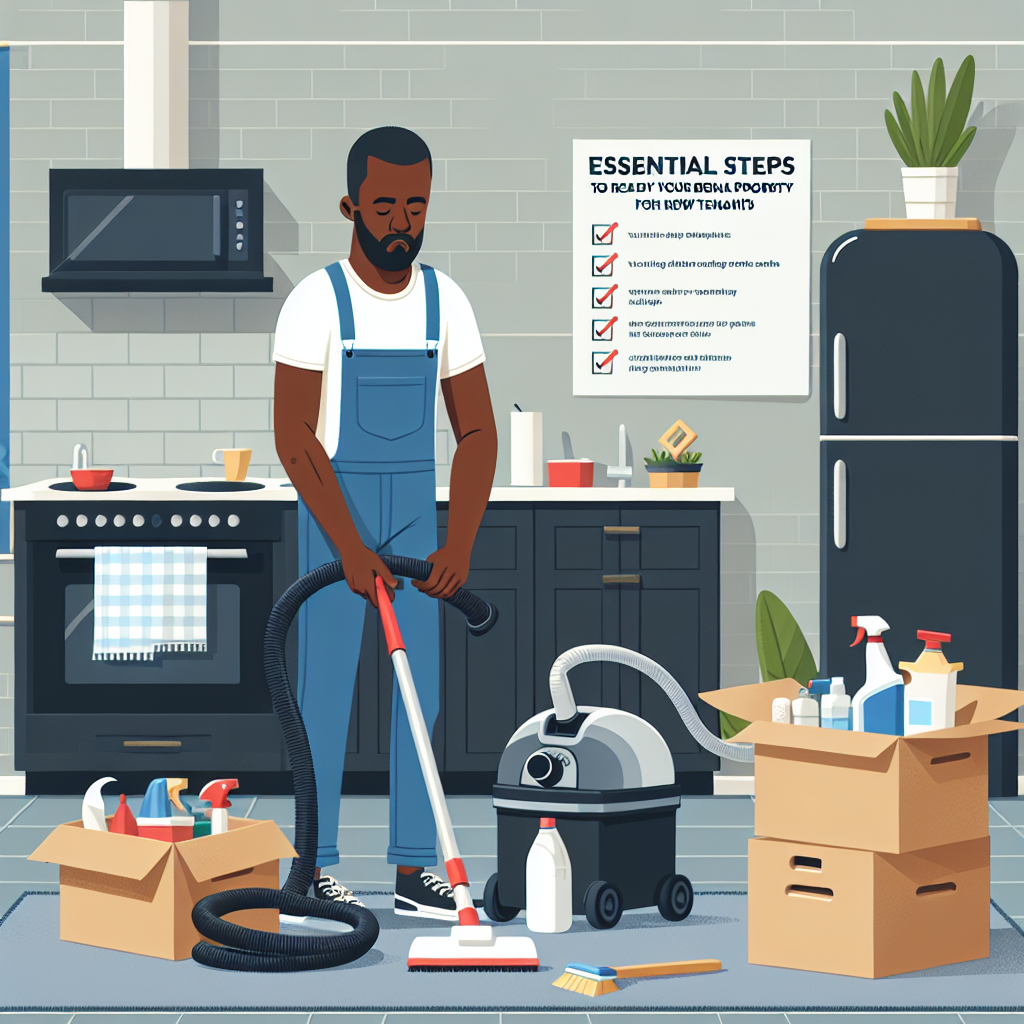-
Table of Contents
- Essential Steps to Ready Your Rental Property for New Tenants
- 1. Conduct a Thorough Inspection
- Checklist for Property Inspection
- 2. Perform Necessary Repairs and Upgrades
- Common Repairs and Upgrades
- 3. Deep Clean the Property
- Areas to Focus On
- 4. Enhance Curb Appeal
- Tips for Improving Curb Appeal
- 5. Update Safety Features
- Essential Safety Updates
- 6. Set Competitive Rental Rates
- Factors to Consider
- 7. Create a Comprehensive Lease Agreement
- Key Elements of a Lease Agreement
- 8. Market Your Property Effectively
- Marketing Strategies
- 9. Screen Potential Tenants Thoroughly
- Tenant Screening Process
- 10. Prepare for Move-In Day
- Move-In Day Checklist
- Conclusion
Essential Steps to Ready Your Rental Property for New Tenants

Preparing a rental property for new tenants is a critical task that can significantly impact tenant satisfaction, property value, and your overall success as a landlord. Ensuring that your property is in top condition not only attracts quality tenants but also helps in maintaining a positive landlord-tenant relationship. This article outlines the essential steps to ready your rental property for new tenants, supported by relevant examples, case studies, and statistics.
1. Conduct a Thorough Inspection
Before you can prepare your property for new tenants, it’s crucial to conduct a comprehensive inspection. This step helps identify any issues that need to be addressed, ensuring the property is safe and habitable.
Checklist for Property Inspection
- Check for structural damage, such as cracks in walls or ceilings.
- Inspect plumbing for leaks or blockages.
- Examine electrical systems for any faults or outdated wiring.
- Ensure all appliances are in working order.
- Look for signs of pest infestations.
- Test smoke and carbon monoxide detectors.
According to a study by the National Center for Healthy Housing, 35% of rental properties have at least one significant health or safety hazard. Addressing these issues before new tenants move in can prevent future problems and potential legal liabilities.
2. Perform Necessary Repairs and Upgrades
Once you’ve identified any issues during the inspection, the next step is to perform the necessary repairs and upgrades. This not only ensures the property is safe but also enhances its appeal to potential tenants.
Common Repairs and Upgrades
- Fixing leaky faucets and pipes.
- Repairing or replacing broken windows and doors.
- Updating outdated electrical systems.
- Repainting walls and ceilings.
- Replacing worn-out flooring or carpets.
- Upgrading kitchen and bathroom fixtures.
Case Study: A landlord in New York City invested $5,000 in upgrading the kitchen and bathroom of a rental unit. As a result, the property attracted higher-quality tenants and the monthly rent increased by 15%, providing a significant return on investment.
3. Deep Clean the Property
A clean property is essential for making a good first impression on potential tenants. Deep cleaning goes beyond regular cleaning and ensures every corner of the property is spotless.
Areas to Focus On
- Clean carpets and floors thoroughly.
- Wash windows inside and out.
- Scrub kitchen appliances, countertops, and cabinets.
- Sanitize bathrooms, including toilets, sinks, and showers.
- Dust and wipe down all surfaces, including baseboards and light fixtures.
According to a survey by Rent.com, 82% of tenants consider cleanliness a top priority when choosing a rental property. A deep-cleaned property can significantly increase your chances of securing a tenant quickly.
4. Enhance Curb Appeal
The exterior of your property is the first thing potential tenants see, so it’s important to make a positive impression. Enhancing curb appeal can attract more interest and set the tone for the rest of the property.
Tips for Improving Curb Appeal
- Maintain the lawn and landscaping.
- Repaint or clean the exterior walls.
- Repair or replace the front door if necessary.
- Ensure outdoor lighting is functional and attractive.
- Clean and organize any outdoor spaces, such as patios or balconies.
Example: A landlord in California spent $1,200 on landscaping and exterior painting. The investment paid off as the property received 30% more inquiries compared to similar properties in the area.
5. Update Safety Features
Ensuring the safety of your tenants is not only a legal requirement but also a key factor in tenant satisfaction. Updating safety features can prevent accidents and provide peace of mind for both you and your tenants.
Essential Safety Updates
- Install or replace smoke and carbon monoxide detectors.
- Ensure all windows and doors have secure locks.
- Check and update fire extinguishers.
- Install security cameras or alarm systems if necessary.
- Ensure stairways and walkways are well-lit and free of hazards.
According to the U.S. Fire Administration, residential fires account for 75% of all fire-related deaths. Properly functioning smoke detectors can reduce the risk of death by 50%, making this an essential step in preparing your rental property.
6. Set Competitive Rental Rates
Setting the right rental rate is crucial for attracting tenants while ensuring a good return on your investment. Researching the local market and understanding the value of your property can help you set a competitive rate.
Factors to Consider
- Location and neighborhood amenities.
- Property size and features.
- Condition and age of the property.
- Rental rates of similar properties in the area.
- Current demand for rental properties.
Example: A landlord in Chicago used online rental platforms to compare similar properties and set a competitive rate. This strategy resulted in a quick lease agreement, reducing the vacancy period and maximizing rental income.
7. Create a Comprehensive Lease Agreement
A well-drafted lease agreement is essential for protecting your rights as a landlord and setting clear expectations for your tenants. It should cover all important aspects of the tenancy and comply with local laws and regulations.
Key Elements of a Lease Agreement
- Names of all tenants and landlord.
- Property address and description.
- Lease term and renewal options.
- Rent amount and payment terms.
- Security deposit details.
- Maintenance and repair responsibilities.
- Rules and regulations (e.g., pet policy, noise restrictions).
- Termination and eviction terms.
According to a survey by Zillow, 54% of tenants have experienced disputes with their landlords. A comprehensive lease agreement can help prevent misunderstandings and ensure a smooth tenancy.
8. Market Your Property Effectively
Once your property is ready, the next step is to market it effectively to attract potential tenants. Utilizing various marketing channels can increase your reach and improve your chances of finding the right tenant quickly.
Marketing Strategies
- List your property on popular rental websites (e.g., Zillow, Craigslist, Rent.com).
- Use social media platforms to promote your property.
- Create a virtual tour or video walkthrough.
- Take high-quality photos of the property.
- Highlight unique features and amenities in your listing.
Case Study: A landlord in Texas used a combination of online listings and social media marketing to promote a rental property. The property received over 50 inquiries within the first week, leading to a quick lease agreement.
9. Screen Potential Tenants Thoroughly
Screening potential tenants is a crucial step in ensuring you find reliable and responsible tenants. A thorough screening process can help you avoid future problems and maintain a positive landlord-tenant relationship.
Tenant Screening Process
- Conduct background checks (e.g., criminal history, credit report).
- Verify employment and income.
- Check rental history and references.
- Interview potential tenants to assess their suitability.
- Use a standardized application form to collect necessary information.
According to a survey by TransUnion, 84% of landlords believe that tenant screening helps them find better tenants. A thorough screening process can reduce the risk of late payments, property damage, and evictions.
10. Prepare for Move-In Day
Once you’ve selected a tenant, it’s important to ensure a smooth move-in process. Preparing for move-in day can help set the tone for a positive landlord-tenant relationship and ensure the tenant feels welcome in their new home.
Move-In Day Checklist
- Conduct a final walkthrough with the tenant to document the property’s condition.
- Provide keys and access codes.
- Review the lease agreement and answer any questions.
- Provide contact information for maintenance and emergencies.
- Offer a welcome package with essential information (e.g., local amenities, trash collection schedule).
Example: A landlord in Florida provided a welcome package with local restaurant recommendations, a map of the area, and contact information for utility providers. This thoughtful gesture helped the tenant feel more at home and fostered a positive relationship from the start.
Conclusion
Preparing your rental property for new tenants involves a series of essential steps that can significantly impact tenant satisfaction and your success as a landlord. By conducting a thorough inspection, performing necessary repairs and upgrades, deep cleaning the property, enhancing curb appeal, updating safety features, setting competitive rental rates, creating a comprehensive lease agreement, marketing your property effectively, screening potential tenants thoroughly, and preparing for move-in day, you can ensure a smooth and successful tenancy.
Investing time and effort in these steps not only attracts quality tenants but also helps maintain the value of your property and fosters positive landlord-tenant relationships. By following these guidelines, you can create a welcoming and well-maintained rental property that tenants will be eager to call home.








